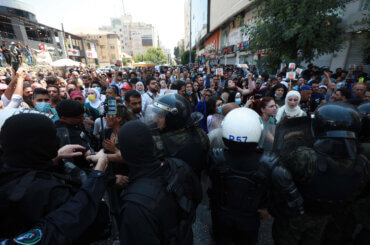There’s a deeply moving piece on the Syrian opposition called One Year of Hope, by Amal Hanano at Jadaliyya. Here’s an excerpt. Thanks to Idrees Ahmad of Pulse media.
The enemy was not one man or even his regime. As questionable motives emerged regionally and internationally, it became very clear that there were no real friends of Syria. As we fought each other, we fought a world that insisted on telling us who we were. Suddenly, everyone was an expert on Syria. Opportunistic pundits sucked the Syrian narrative like leeches, dispensing complex conspiracies, warning of the regional and global political interests at stake while belittling the people’s struggle. Opportunism seeped into the Syrian opposition as well: they splintered into rivaling groups, each betraying the other to prove itself worthy of the Syrian street’s loyalty but in the end, their divisiveness rendered the groups unworthy and incapable of defending those blood-soaked streets. The truth of Syria was lost somewhere in the middle of an axis between east and west, right and left, Sunnis and minorities, along fault lines we had never asked to define us, but they did.
There were other Syrian stories hidden from the stark black-and-white sectarianism and sweeping generalizations repeated over and over in the media — not just of Christian and Alawite revolutionaries, not just of the silent betrayal of Sunni business men in Damascus and Aleppo. Stories from Baba Amr of opposition families who delivered pots of home-cooked meals to sympathetic soldiers at checkpoints and received the pots later, filled with bullets. Or stories of guards who promised prisoners that they would not follow their orders of torture. Or stories of Alawite youth driving through regime checkpoints with bottles of alcohol on the dashboard as decoys only to unload trunks filled with medical supplies to field clinics. These slices of daily interactions between the Syrian people never made it into the “news.” They didn’t fit the narrative of hate we were supposed to follow.
….And as March 15, 2012 rolled by, it seemed every few days brought yet another anniversary, death days instead of birthdays. We relived what had happened one year before as the day brought its fresh casualties — names we would carefully record to celebrate next year. The revolution is now caught between past and present — its recorded memory is written, photographed, and videotaped as if we now fear forgetting as much as we used to fear speaking.
And we knit, together, Syria’s bloody destiny, every murder intertwined with injustice, every revenge a setback, every chant a victory. Our revolution began in a moment of indignity and humiliation too great to bear, like Dickens’ French peasant child crushed under the wheels of nobility. But it also revealed what we had concealed as a people for decades. Our ultimate fear was not the fear of the unknown, or even the fear of tyranny. It was the fear of exposing what we had tried to hide, the universal truth that everyone tries to hide, but this time in history, it was Syria’s lot to rip itself apart and have its secrets revealed to a silently observing, judgmental world: that the best and the worst, wisdom and foolishness, belief and incredulity, light and darkness, the spring of hope and the winter of despair, exist together. Within us all.
Anthony Shadid knew this very well. He knew it is impossible to mend what was left of our country until we found a way to become greater than the sum of our battling contradictions. He knew we had nothing left but our limitless imaginations that were still in chains though we struggled to break free. Our Syria hovers between heaven and earth, oscillates between dreams and nightmares, it moves from revolution to war, from a once promising spring to yet another cruel summer, but despite it all, we hope.


Syria is like Poland back in the last century; it really does not matter to the outside world elites what Syrians want as a people, but it’s all about Syria as a strategic location in a myriad of ways. It’s a tad helpful to review a Mondoweiss article from a few days ago: https://mondoweiss.mystagingwebsite.com/2012/06/syria-no-to-intervention-no-to-illusions.html
For the Western elites, led by their Jewish diaspora, or rather that diaspora’s lobby cash, and control of mainstream media, Syria is all about being Iran’s only buddy–Iran, a middle east state that actually treasures being independent of the West (and has OIL), self-governing one might say…. Iran threatens Israel’s hegemony in the Middle East, and Assad’s Syria is Iran’s buddy…. This explains all the BS coming from Hillary et al.
I find it difficult to be critical of Amal’s sentiments here. I feel for his/hers dilemma. Their rebellion began as legitimate protest against the hated dictatorial regime led by the Baathist. Unfortunately, that movement has been taken over by armed terrorist groups supported by the Arabian monarchies and backed by US, UK and French imperialists. Sorry Amal, but your efforts to bring change to Syria are now being used by some of the more reactionary forces on this planet.
This is what happened in Libya. Within days of the first uprising against the hated Khadaffi, organized and armed groups, manned by Al qaida activists, took over the rebellion. They were supported by the Saudi and Qatar monarchies and were backed up by Nato military forces. What happened there can be accurately called the Nato led revolution. Sorry Amal and other deluded progressives, but Nato does not support revolution.
I know that this site “exulted” with the downfall of Khadaffi. But not prominently mentioned in that downfall was the ethnic cleansing of the people from the village of Tawergha. This village consisted of 40,000 people who were Libyan citizens. They also happened to be “black”. Reporter who recently visited there saw only smouldering ruins. Imagine the uproar if that was a Palestinian village.